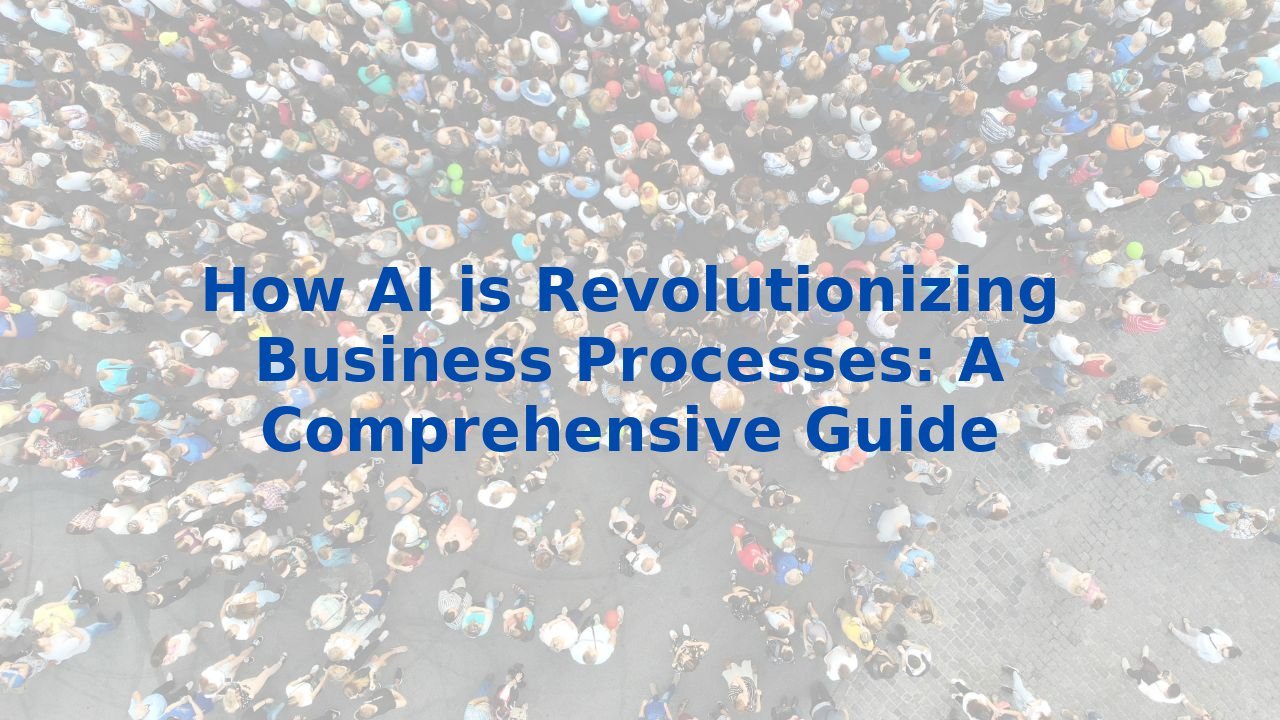How AI is Revolutionizing Business Processes: A Comprehensive Guide
The Evolution of Business Processes with Artificial Intelligence
Introduction
In the dynamic world of modern business, staying ahead means continually evolving. One of the most powerful tools in this evolution is artificial intelligence (AI). It acts as a catalyst, reshaping business operations by automating mundane tasks, providing profound insights into consumer behavior, and refining decision-making processes. In this comprehensive guide, we'll delve into how AI not only transforms business processes but also serves as a key driver for organizational efficiency.
1. Automating Administrative Duties
Administrative tasks can be time-consuming and often serve as a bottleneck in productivity. AI alleviates this burden by automating routine functions such as data comparison, scheduling, and report generation. Consider a manufacturing environment where AI can detect product defects in real-time. This capability allows managers to focus on strategic oversight rather than spending precious hours on routine quality checks. By freeing up time and resources, AI enables a smoother flow of operations, encouraging companies to embrace a more agile approach.
2. Enhancing Hiring Practices
Finding the right talent is paramount, yet traditional hiring processes can be exhaustive. AI steps in to streamline this ordeal. With intelligent algorithms that analyze candidate profiles, AI narrows down applicants who fit not only the skill set but also the company culture. This enhanced hiring practice saves organizations invaluable time and helps in selecting candidates who align closely with their values. Additionally, AI-powered simulations provide insights into behaviors and personalities, offering recruiters a deeper glimpse than a resume might allow.
3. Revising Existing Jobs
Rather than simply automating jobs away, AI often leads to a redefinition of roles within organizations. Many businesses are adapting by training their workforce to undertake more complex responsibilities that complement AI capabilities. For instance, in customer service, AI can preemptively resolve issues, allowing human representatives to tackle more intricate problems. This evolution in job responsibilities creates opportunities for personal and professional growth, ultimately making the workforce more valuable.
4. Transforming CRM Systems
Artificial intelligence is reshaping Customer Relationship Management (CRM) practices. Traditional systems frequently require substantial manual oversight, risking data inaccuracy. In contrast, AI-powered CRM solutions offer self-updating functionalities that enhance efficiency. They provide sales teams with tailored insights by analyzing customer profiles and historical data, ensuring that marketing strategies meet customer needs effectively and responsively.
5. Streamlining Inventory Management and Logistics
Inventory and logistics have seen a dramatic enhancement through AI integration. With the ability to analyze extensive data sets from various sources, AI offers real-time insights into inventory levels and supply chain disruptions. This analytical prowess allows organizations to optimize their operations, minimize costs, and enhance delivery speed, all crucial components of a competitive business.
6. Enhancing Customer Service
The customer service landscape has been irrevocably altered by AI, particularly through the rise of chatbots. These digital assistants manage inquiries, maintain schedules, and streamline processes, significantly improving customer interaction. By taking on routine questions and issues, they empower human representatives to engage in more meaningful interactions, fostering a higher level of customer satisfaction.
The Benefits of AI for Business Efficiency
AI's impact on business efficiency is multifaceted:
- Increased Efficiency: By automating repetitive tasks, AI minimizes the time spent on mundane activities, allowing employees to focus on high-level problem-solving.
- Deeper Insights: AI accelerates data analysis, revealing trends and insights that may elude manual processes. This fosters informed decision-making that can shape a business’s strategic direction.
- Improved Decision-Making: Real-time data analysis and predictive algorithms bolster decision-making processes, providing actionable information that can drive growth and innovation.
The Importance of Training Employees for AI
The integration of AI into business processes is more successful when employees are trained to wield these new tools effectively. The advantages of providing AI training include:
- Enhanced Collaboration: Well-trained employees can integrate AI into their workflows seamlessly, driving collaboration between human ingenuity and machine efficiency.
- Upskilling Workforce: Training empowers employees to undertake complex tasks, focusing on high-level thinking that AI cannot replicate. This fosters a culture of continuous learning and adaptation.
- Adaptability: An agile workforce is invaluable. Employees proficient in AI are better equipped to manage changes, ensuring the organization remains responsive to an ever-evolving marketplace.
Conclusion
In conclusion, AI stands at the forefront of a revolutionary change, reshaping business processes from administration to customer relations. By enhancing efficiency, providing deeper insights, and improving decision-making, AI serves as a crucial driver for organizational success. Moreover, investing in employee training ensures that these benefits are fully realized, equipping businesses to thrive in the complexities of the modern market. As we embrace AI, we don't just leverage its capabilities; we broaden horizons, opening doors to new possibilities for growth and innovation.



